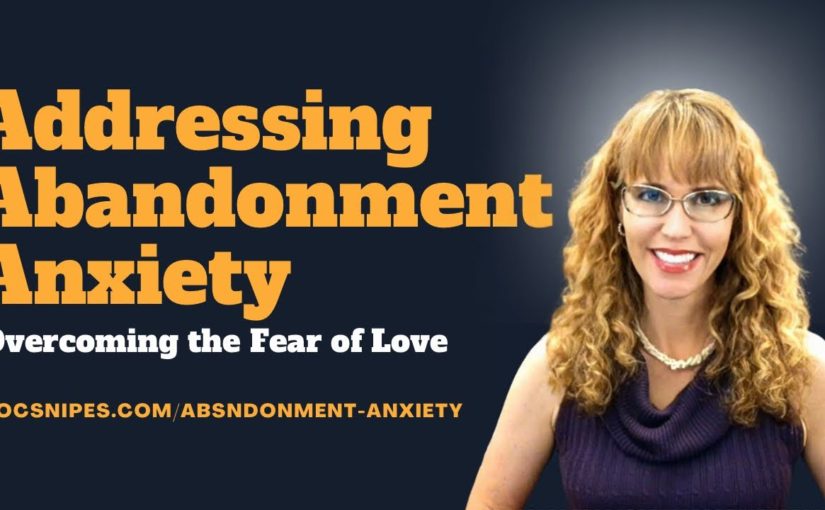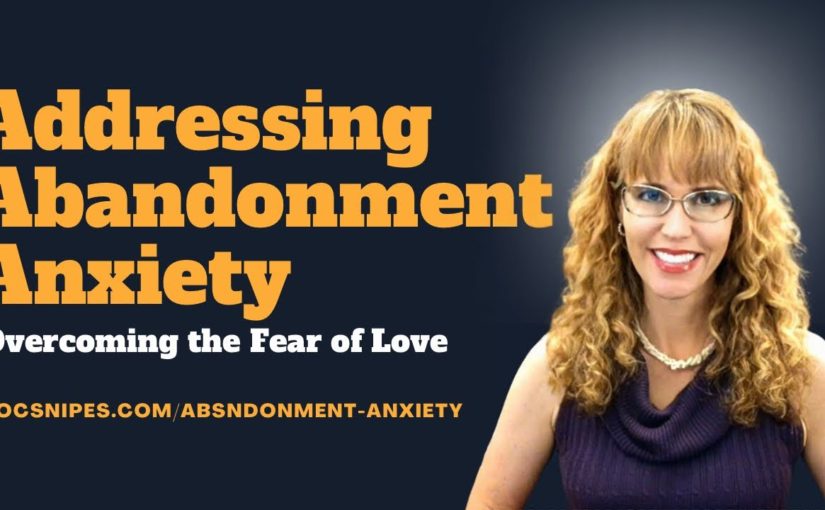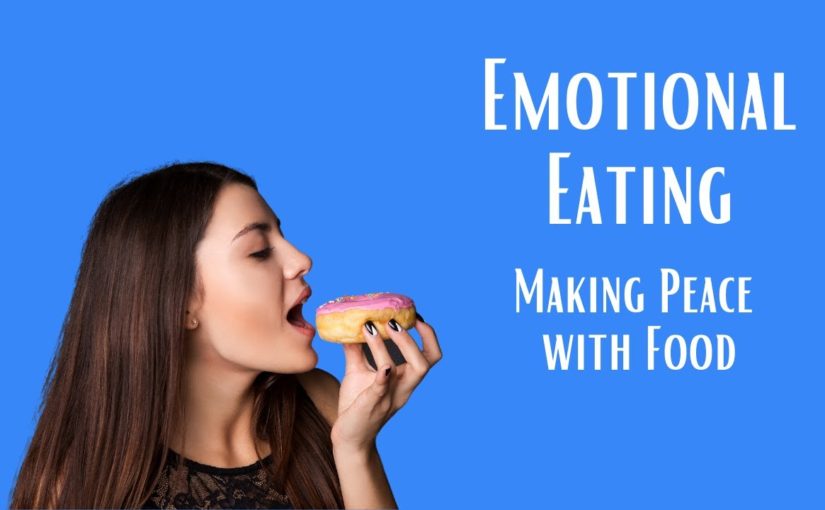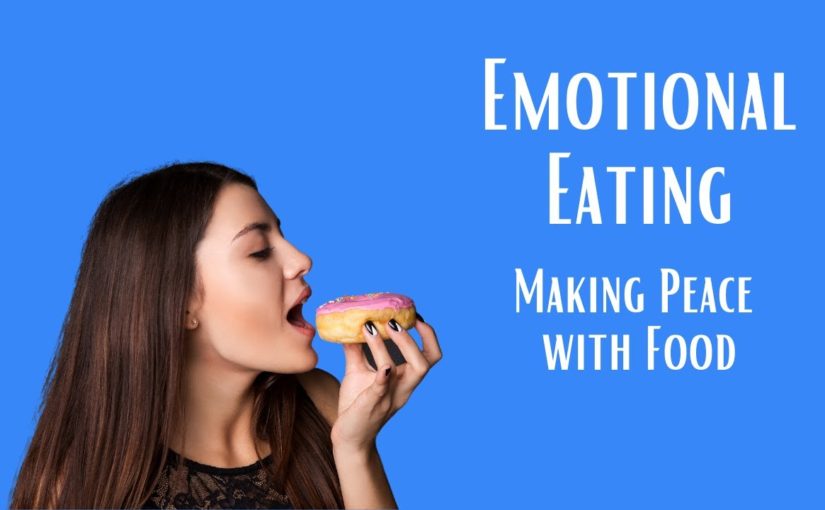This episode was pre-recorded as part of a live continuing education webinar on demand. Ceus are still available for this presentation through all CEUs registered at allies com, counselor toolbox, hi everybody, and welcome to today’s presentation on emotional eating and making peace with food during the next hour.So we’re going to define emotional eating and differentiate it really from eating when to celebrate and when it’s a problem and also differentiate, differentiating it from eating disorders will explore emotional eating in terms of its, beneficial functions and rewards and discuss.Why restrictive diets, don’t resolve emotional eating a lot of times? People will say you know, I have been on this diet forever and it doesn’t seem to be working or I can’t seem to stick to any diet that I try and we’re going to look at different reasons why this might Be what is emotional eating and it’s exactly what it sounds like it:’s eating in response to emotions and feelings other than hunger.So if you’re eating, because you’re bored, if you’re eating at someone and sometimes especially if you are angry at someone or disappointed in someone, you may eat and sort of be eating and thinking you made me do this so eating At someone eating to forget or distract yourself eating, to feel better because when you eat, regardless of what you’re eating, but especially if you eat high sugar high-fat foods, you’re going to release serotonin and dopamine eating out of boredom.You know hand to mouth bang, eating out of habit and, as I said a few minutes ago, not all emotional eaters have an eating disorder um and we want to differentiate that.Does it mean that their eating is not problematic to them? No, not at all.

If they’re telling you it’s a problem, then it’s a problem.They may not meet the criteria for binge eating disorder or bulimia, but it’s important to address it because they understand that they’re eating for a reason.Other than hunger, they want to stop because they want to eat, for hunger, but not otherwise, and for us as clinicians.The first thing we need to do is understand: why is it that they’re eating? Is it boredom? Is it a habit, so they need to keep a food log or a food journal for over a week or two weeks, and sometimes when people come in for an assessment, especially if that’s one of their main presenting issues? I’ll start by just doing a retrospective of the last three days to get an idea of what may be triggering some of their eating episodes.And then we can look at some of the habits or bad habits, maybe that they’ve gotten into, and start talking about ways to address those remembering that Rome wasn’t built in a day this isn’t going to go away overnight.But a lot of times, if you give people some tips, tricks, and tools to think about implementing when they walk out of your office after the assessment before the first official session, it provides them some hope and gets the momentum going and again you don’t Have to binge to be an emotional eater, some people graze all day long.Some people will eat and it’s not what would be considered technically a binge, but it’s more than they had anticipated.Maybe they go back for second helpings or third helpings when they weren’t hungry, but it was good.So why is eating so soothing? There are a lot of reasons.Now there’s obvious it’s, tastes good, so that’s.You know the big obvious bonus, but thinking about the function eating serves, we have to eat to survive.When you were an infant, it eating involved a closeness with your parental unit, which could release oxytocin, and I say, parental unit because even if it was dad feeding the baby a bottle there was that connection.There was that contact that caused the infant and the parent to release oxytocin. This is our bonding chemical, so eating was associated early on with bonding food may also have been associated with sleep.If the infant or child was given a bottle every night to go to sleep, then they may start thinking or they may be in the habit of eating to wind down or calm down, and we need to help them figure out different ways to do That as a toddler, what eating mean think about when you went from well, we probably don’t, remember that, but think about when your kids went from eating.You know food out of a jar to even their first Cheerios.That was a huge figure out.How to pick up that little cheerio and get it in their mouth and it involved exploration and mastery.They were discovering all different types of textures and tastes and figuring out what smell went with what taste, and it was a cool and exciting time for kids, and I mean think about it.They’re like a year old, so it doesn’t take much to amuse them, but this was the rewarding reward.Equals dopamine equals let’s do that again.It involved power and control of the child.At this point was starting to be able to feed himself or herself and was starting to be able to be somewhat independent of the parent when it came to the basic physiological function of eating. So eating itself had its rewards and it was self-esteem building because the child started learning.You know how to feed yourself and how to ask for what he or she wanted, at least in terms of food.There are formations of memories around foods, even as early as toddlerhood.You know we have celebrations, we have birthdays, we have different things and most children have certain foods that they like, and it could be because the first time that ate that food was a really happy experience or it could be just that’s, their favorite Food and that’s all they want to eat, but they remember that food and they remember when they ate it, they felt good.They felt happy so as an adult there,’s a part of their brain going chicken nuggets.Make me happy now that’s, how the toddler thought as an adult.We can understand that chicken nuggets themselves, aren’t making you happy, but you see the connections that we’re making.Here there’s been an association between happiness and chicken nuggets unhealthy foods, especially for children when, as adults, we’re still able to control what they eat.Your sugary foods and your unhealthy foods are usually reserved for treats or rewards.So when you’re feeling like you need to be rewarded when you’re feeling like you want to feel good, sometimes you’ll resort to those things. When you were a kid that made, you feel good like chocolate, chip, cookies, Haagen Dazs, or whatever it was for you.We’ve talked in the past, about associations and conditioning, and this is all coming back kind of full circle now because we need to understand that our brain has associated pleasure and reward with food for a lot of different reasons.Not just because of nourishment looking at the reasons why your patient eats is going to help you understand what underlying issues you may need to address in treatment.Culturally, we associate eating with caring and celebration and think about birthdays and holidays.What do we get together? We have buffets, we have pot Luck,’s.When someone passes away.What do you bring food over when somebody’s sick? What do you bring food over to in our culture? There is a lot of emphasis put on eating and nourishing, and that’s, true of a lot of different cultures.Low blood sugar can cause feelings of depression and anxiety which are quelled by food.So if somebody typically doesn’t eat well during the day, you know they go long periods without eating or if they have blood sugar issues, to begin with, and then they eat they feel better.So when they start feeling not so good, what do you think their first reaction is, let me eat and see if that helps evolution, predisposes the human body to crave high sugar, high fat, high-calorie foods for quick energy and to prepare for a famine. Our bodies are cool and frustrating at the same time because you know your body takes in this these foods and it says we’re going to secrete, the most amount of dopamine and the most amount of reward for these high-calorie foods because We want to make sure we’re prepared in case there’s a famine back.You know in the day many many many years ago, hundreds of years ago we couldn’t guarantee.We would have a meal every day, let alone three meals every day.So the body prepared – and it said alright – we need to get whatever we can when we can.So we’re going to make this higher fat higher calorie food more rewarding.Now I said it:’s also can be a blessing and a curse.Today, there’s still a little part of our primordial brain.That says, if it thinks there’s a famine, it will slow down your base metabolic rate, which causes people to gain weight.We see this a lot in people with eating disorders, who tend to not take in very many calories, or if they take them in they purge them.So the body goes well. I can’t guarantee I’m gon to get enough food.I’m going to get enough energy to survive.So I’m just going to turn down the thermostat a little bit and turn down the base metabolic rate, which compounds the problem for the person with the eating disorder.So it’s important to understand that the brain is somewhat active in what’s going on.So I keep saying we need to figure out what’s behind or underlying the craving.First, we need to rule out physical causes for some people.It’s as simple as this.If they’ve got low blood sugar because they’re not eating too often and obviously as counselors, we’re not going to diagnose this their doctor or their nutritionist will, but we can start exploring and go.It sounds like you might need to look at having your blood sugar checked or talk to your doctor about how frequently you need to eat because some people – and I know I’m – are very guilty of it.If I get into it into a groove doing something I’ll eat breakfast and then I’ll get into a groove and before I know it, it’s 3 00 in the afternoon and I haven’t eaten for like a whole bunch of Hours I’m not doing math today and my blood Sugar’s low and I’m starting to get foggy, headed and irritable and tired. So it’s a real, simple fix there in our society we are so driven and we are so.We get so caught up in things because that’s such a fast pace that it’s easy to forget to eat or is easy to avoid eating so that’s.The first thing we want to rule out.Are you eating in response to low blood sugar, which is making eating, seem more rewarding when you eat in response to low blood sugar a lot of times, people who do that end up eating more than they normally would because they start eating fast.It’s like I’m going to shovel, in as much as I can.Your brain doesn’t register you’re eating for 20 minutes or so so, before their brain, even registers.What’s gone on and gets the blood sugar back up? They’ve already eaten a whole ton of food.Why is this under-emotional eating? Well because generally, when they go in to just start eating, yes, they’re hungry, but they’re, also cranky and irritable, and most of the time they’re.Not thinking about I’m eating for the nourishment it’s, I’m eating, feel better lack of sleep, and this is so true for shift workers as well.As you know, new parents and college students, and anybody who’s not getting enough sleep. If we are surviving on sugar and stimulants, we’re going Peak and Lower Valley, Peak, and Lower Valley, and you just keep going up and down until you just crash, because every time you crash you crash a little bit lower.So if somebody’s on that roller coaster, they’re going to feel worse between you know: eating episodes they’re going to feel tired.They’re going to feel a flood of sluggish irritable fatigued and, to a certain extent, maybe depression, and they may be missing attribute those feeling, those emotional feelings to emotions versus physical causes, and likewise we also want to make sure that you know we’re addressing The emotional causes because there’s probably stuff there too, but if they’re not getting enough sleep and they’re living on sugar and stimulants their body is kind of in a state of hyper-vigilance, a lot of times it’s exhausted.So they’re going to be tired and cranky.So those are a couple of things that we want to look at.Those are relatively easy fixes or at least relatively easy things to point out and go let’s think about this.One of the things that I suggest for a lot of my clients is just to take a week and mindfully and it is difficult but try to eat healthfully.You know try to eat a few times a day.You know try to eat like three meals a day and get enough water and try to get enough sleep and try not to overdo it.On the stimulants at the, beginning I, 39, am not going to say cut out anything because that 39, is not, realistic and it’s not fair, and they 39, are probably already struggling if they’re coming in to see me, so if I go hey Let’s just turn your world upside down and guess what you’re not going to drink any caffeine anymore. It’s not going to create a happy person, so I asked them to try to make some small changes and see if that starts, to help dehydration causes fogginess and symptoms of depressionWe want to make sure that they rule that out and too many stimulantsAlso causes dehydration, so you know we’re looking at some of the physical causes of irritability and fatigue and cravings because again we’re going back to when I felt this way before not looking at it.Why I felt this way.But when I felt irritable depressed cranky, what made me feel better and generally food, and generally it’s, not good food.For me, it’s M Ms.I love my M Ms, especially the ones with almonds, but I digress.Nutritional causes of cravings, high carbohydrate, and high starch foods caused a greater release of serotonin and endorphins.So if you’ve got somebody who’s depressed for whatever reason that they may crave these kinds of foods to increase their serotonin level or increase the endorphins, their energy levels, chocolate people who crave chocolate may be low in magnesium.It also um the level of magnesium affects how much serotonin is available again. Just I keep saying this just for legal reasons.We want to make sure their doctor or nutritionist goes in and makes this diagnosis, but if there are particular foods that they do crave, they need to bring that up with their medical provider if they’re craving fatty foods.Now again, fatty foods are just good.I love fried foods, but it also could mean that they’re not getting enough Omega threes, Americans, typically don’t and interestingly, if they crave soda, they may be calcium deficient, who knew so?These are things to take a look at to ask people.You know if they’re craving soda, maybe cutting back on their soda a little bit and seeing what happens and or getting blood work done.

Once we’ve ruled out the obvious physical causes.They’ve gone to the doctor.Gotten blood work done everything I’m coming back happy.They’re getting enough sleep, but they’re still eating when they’re, not hungry, we need to rule out habits. Is there a particular time or activity that makes you crave this food? When I was growing up, I would go to the grocery store with my mother, and on the way back home from the grocery store.She would always we would always get junk food and she would get a bag of chips and put them in the front seat.It was like a 20-minute drive from the grocery store to our house and by the time we would get back to the house.We would have put a good dent in those potato chips.That being said, I got into the habit of whenever I went to the grocery store.I would get something out of the bag and put it in the front seat and eat on the way home.Now am I paying attention to what I’m eating? No likely am I eating, because I was hungry, probably not so.We want to look at habits.A lot of people will eat when they are watching TV.It’s a huge one. So we want to not do that or if you’re going to eat when you’re watching TV make sure you sit at the table.At least that makes you a little bit more mindful so think about whether are there particular times or activities that you eat and you’re just not hungry.Are there particular times that you mindlessly eat, like, like, I said when you’re driving or when you’re watching television? Those are both habits and can be mindless because you’re not paying attention to how much is going in your mouth.You’re not probably paying attention to the taste and you’re not paying attention to whether you’re full or not.So if you’re mindlessly eating, then there’s going to be a lot more calorie consumption.In addition to the fact that you’re not eating because you’re hungry, you’re just eating to eat, are you going too long between meals than needing a sugar boost which leads to a sugar crash? So again that’s a physical cause? But we want to rule it out.These are bad habits that we can tend to get into other things that can be construed as bad habits are eating without putting food on a plate.If you eat straight out of the bag, you’re going to eat.More than if you put it on a plate, so put it on a plate, sit down, try not to watch TV, all the things that your grandmother would have told you.So what do we do about it? Emotional eating interventions? I talked earlier about the food diary. Do a retrospective during the assessment if they want to get a jumpstart on things, but have them keep a food diary, preferably for the duration of treatment, but at least for a week.What time did they eat? Were they craving just any old food or something salty, something that was sweet, something that was sour? This will give you a general idea and can give their medical provider a general idea if there are any nutritional imbalances or if there are particular associations.What emotion or state were you in, I say state because being exhausted is not necessarily really an emotion.Were you happy sad, mad glad exhausted drained whatever state feels like it would work, and then, because of why were you feeling this way it doesn’t have to be a dissertation? It can be short and sweet, but I encourage clients to write down everything.They eat before they eat it during the first week, or you know, like I said, preferably throughout the entire course of treatment why, before they eat it because it’s a stop, remember we’ve talked before about how we have an urge.We have a craving, we have an urge and then we engage in the behavior oftentimes without stopping mindfully.Think is this what we want to do this provides that stop.It says: okay, I’ve got it to write down the time, and then I’ve got to think about why I’m eating, and honestly a lot of clients notice, a reduction and their habit of eating when they have to do this, just because they don’t want to record-keeping that up for a month or two months helps break some of the habits, eating that they might do like.I said before when they’re eating, I encourage them to use a plate.Sit down. Don’t walk around don’t stand at the counter, eliminate distractions as much as possible and focus on the food you’re eating that goes with mindfully eating.What does it taste like? Is it good to take small bites when my son was young, I think I’ve shared this before he had gastric reflux and we would sit down at the table and I would shovel in food as fast as I could get it in my mouth because He couldn’t be put down for too long before he would start to get fussy, at least until we figured out that he had gastric reflux and Zantac was just a lifesaver.I developed that habit when he was little and I kept it up for a while.It took a while to learn for me to learn to go back to take.You know reasonable bites and tasting my food, and even today, if I’m not paying attention too much, I’ll eat my dinner fast and then I’ll sit there and I’ll be like well.Yes, I’ll taste that a little bit later, because I didn’t taste it when I ate it encourage clients to be aware of their eating habits, and try to avoid setting up a binge by restricting certain foods.Now.Does that mean you have to have cakes and candy and whatever your trigger foods are in your house all the time and in your face? No, I would encourage people not to do that, but to say you know, I said for me M Ms, is one of my favorite reward foods.

If you will, I don’t keep them in the house, but I will allow myself occasionally to buy a small snack-size pack of M Ms, when I’m out or I will get a regular-size pack and I’ll share it with my daughter, so I’m not restricting it.I’m not saying I can never M. Ms again, I’m just not making it available to myself when I might have some unrestricted time, try to avoid buying a bunch of comfort foods and keeping them around the house, and when you’ve got kids when you’ve got family, it’s not entirely possible, usually to not have some of that stuff around but try to avoid having the things that you particularly used for comfort, because if it’s not readily available, then you’ve got to focus on guess what dealing with the emotions.Instead of stuffing them with food, try not to go too long without eating.Like I said earlier, if you go too long, then by the time you get to the food, your blood, Sugar,’s low and you’re just shoveling it as fast as you can initially distract.If you know that you’re getting you’re eating and you’re, like I’m – really not hungry, but I want to eat, take a bath, take a walk, call a friend, heaven forbid get on Facebook.Whatever it is, you can do to distract yourself for 10 or 15 minutes if, after 10 or 15 minutes, you’re still going, I want whatever it is, then you can decide what to do about it.Then, most of the time when people stop and go, I’m not hungry.Let me distract myself.They get caught up in that distraction and before they know it, they’ve forgotten about the craving, and identify the emotions.If you know that you’re not hungry, but you want to eat, then say: okay, what’s going on what’s going on with me? It doesn’t mean that the person is never going to eat when, when they’re upset, because a lot of people do, and is it the end of the world, probably not necessary if they can start reducing the frequency of times that they eat.In response to emotional distress that’s, what we want, we want to progress, not perfect if it’s, depression, what’s causing them to feel hopeless or helpless right now, if it’s, stress, anxiety, or anger, remember our big kind of lump together stuff. What are they stressing out about? Do they feel like they’re overwhelmed? Are they afraid of failure, rejection, and loss of control of the unknown? We’ve gone through those things.We want them to identify what’s going on with them, and then they can make better choices about how to deal with it.So general coping helps them develop, alternate ways of coping with distress.Distract we’ve, already kind of gone over that one.I encourage people – and you know it’s – one of those DBT things – that a lot of therapists encourage their clients to keep a list of things.They can do to distract themselves because it’s not always practical to get up and go on a walk.If you’re at work or it’s, you know two in the morning.So what else can you do to distract yourself? Talk it out with a friend with yourself with your dog? Sometimes you just got to get it out.People who are more auditory will prefer talking it out as opposed to journaling it now.If they talk it out with themselves, they can record it if they want to, or sometimes it’s just better to have a dialogue with themself. If it worked for Freud, it can work for other people journaling.If your clients are inclined to journal, encourage them to write it down.Sometimes just getting stuff out of your head and onto paper will help the feelings dissipate a little bit.So you’re not mulling them over and obsessing over them and getting stuck in those thoughts and feelings.Additionally, while you’re distracted talking it out or journaling, this is also your break.Your stop between the urge and the behavior make a pro and con list of the de-stress, not the eating whatever it is, that’s stressing you out and how can you fix it or what are the pros of this situation and what are the downsides To this situation, encourage them to focus on the positive.You know.If something stressing you out at work, you know you’ve got a big meeting coming up or something you don’t want to do or what it is.You can get stuck on focusing on that or you can focus on the positive that you do have a job.That meeting only comes around once a month. You can it’s time you don’t have to be doing paperwork whatever the pros are for that person encourage them to focus on the positive.If you’re distressed because of some kind of a failure or perceived failure, figure out what you learned from it, whether it was a relationship failure, or maybe you learned what not to do in a relationship anymore. Maybe you learned things that you may have ignored.Maybe you learned what you should have done instead, but how can it be a learning opportunity, instead of somewhere to stay stuck and finally, if something’s making you upset if something’s causing anxiety, depression, hopelessness, helplessness, whatever the negative feeling figure out.If it’s worth your energy to get stuck here, is it worth the turmoil? Is it worth you know having to pacify yourself with food or whatever? It is a lot of times people say you know what now it’s, just it’s, not even worth my effort.It’s not worth moving me away from my goals, because my goal is to stop emotional eating.My goal is to eat for hunger, so I can go to dinner with people and feel comfortable.I can be at a party where there’s a buffet and not feel stressed out that I’m going to go and eat half the stuff on the buffet that’s my goal so is holding on to whatever this de-stress is getting me Closer to being able to do those things and generally the answer:’s no develop alternate ways of coping with the stress the ABCs, the a is the activating event.What is stressing you out and what’s causing the de-stress C is the emotional reaction.Angry depressed stressed, whatever be: are your behaviors? What behaviors or B are your beliefs? Sorry, what are the beliefs that are in there that may need to be addressed? What kind of things are you telling yourself, and, and how can you counter them? Cognitively eliminate your vulnerabilities.You knew we couldn’t get through a presentation without talking about vulnerabilities. If someone is well-rested.Well, the fed has a good social support network, not stretch timewise.Then it will be easier to deal with stress or stressors when they come your way.You’ll have more energy to deal with it, so there won’t be this overwhelming feeling of I just want to bury my head in a jar of peanut butter, be compassionate with yourself.Some days, you know you’re, just going to feel anxious.You’re going to feel depressed.You’re going to get angry.You can beat yourself up over it and you know a lot of people do.Is that the best use of your energy or can you be compassionate? Can you learn from it? Can you give yourself a break and go? You know what I’m having a bad day today and that’s okay, I’m not going to unpack and stay here, but I’m not going to fight.It either helps clients learn how to urge surf help. They understand that, just like a panic attack just like a wave just like a lot of other things in life, it will come, it will crest and it will go out again, so they can sort of identify where they are on the energy of that Urge other tools people can use close the kitchen once I have the kitchen cleaned and you know all the dishes are done and it looks pretty.I hate going in there and finding dishes in the sink again now I’ve got teenagers, so we always have dishes in the sink.But before I had children, you know at seven o’clock.I finished all the dishes and closed the kitchen, and that would be enough motivation for me to not go in there and at least not use plates and stuff to eat.So if we’re saying that we’re going to only eat using utensils plates and sitting and all that stuff that we already talked about, then once you close the kitchen, you’re not going back in, there turn off the light.That also helps so you’re not being attracted to the pretty lights, and you know all the goodies that are in the kitchen to brush your teeth.This is something my grandmother used to do and it works.There’s some research behind it.Minty flavors reduce our appetite.So if you brush your teeth, you get all the other flavors out of your mouth and it reduces your urges to eat because it again it’s clean and fresh. And do you really want to brush your teeth again, and meditate, sometimes just getting in a space where you’re, not obsessing about anything, can help people get past that urge to self-soothe by eating a CT for emotional eating.What am I feeling or thinking about what’s going on with me right now? What is important to me? So if I am thinking I want to eat, I want to you know just dive into this jar of peanut butter, and then I think about what’s important to me.Is it important to me to get control of this? Is it important to me to you know, be able to fit into my clothes in six months or not? So what is it in? What way is controlling my eating habits and eliminating emotional eating important to me, and how does that get me closer to other things that are important to me, and what other things could I do? That would get me closer to my goals.So if the goal is to have improved relationships, be able to feel more comfortable around food reduce the stress around going out to eat, and just around food in general, what else can you do when you are stressed out? Somebody also suggested that adding a blue light in the refrigerator decreases the appeal of foods, which is interesting because yellow red and orange, and browns, I think Pizza Hut – are all foods that increase people’s, hunger and desire to eat.But blue is just a completely different primary color, and adding a blue hue seems like that would be effective, so cool thanks for that.Little tidbit there holiday help, and you know we’re coming into the holidays.So I’ve got to bring that up at every single glass and choose lower-calorie foods.If you tend to get stressed out or caught up or mindlessly eat when you are at family gatherings.Okay, you know cut yourself a break, know that that’s, probably going to happen, and fill up on the lower-calorie foods.The carrot sticks the broccoli, the white meat, turkey, anything that’s available, that’s, not like sweet potato pie or brownies, keep water or low-calorie beverage. In your hand, if you’ve got your hand full, you can’t eat at the same time.So you know if you walk around with a cup in your hand, it helps talk to people.Hopefully, you don’t talk with your mouth open or talk with food in your mouth.So if you’re talking to people, you’re not going to be as inclined to go and get something to eat because you’re wanting to stay engaged in that conversation.Stay away from the buffet, especially if you know that it could get stressful, or maybe you know for me, I turn into a pumpkin at like 7 30 at night.I get up at 4 00, but I turn into a pumpkin at 7, 30 and a lot of times holiday parties and those sorts of things are at eight, nine, o’clock at night, and you know I’ve already turned into a pumpkin.So I know that if I go to those I’m going to be more likely to eat just to kind of stay away because I’m tired and it’s a bad habit.It’s not because I’m hungry.So I know I need to stay away from the buffet during those times we rehearse refusal skills.If somebody says. Oh, you, I’ve got to try it by two.This figure out how you’re going to address that ahead of time, because there’s generally probably a lot of really good foods, and you may really want to taste some, but sometimes people who emotionally eat know if they start eating.If they start eating high-fat high calorie foods, they’re going to want to eat everything.So if I start with one bite of a brownie, I’m going to want to eat every suit that’s on the table.If they know that, then they may want to choose to not even go down that road at that juncture, encourage people to stay mindful of their distress meter before they go back for another helping and ask themselves, am I hungry? Am I just wanting to taste what’s here and how do I feel about that? Or am I eating just because I don’t want to be here and I’m bored and I want to fill the time? Have people keep an index card with their coping mantra and two reasons they don’t want to emotionally eat, so I need to be here.I can do this whatever the mantra is that’s going to get them through the night, whatever they’re.Telling themselves that it’s going to help them plow through and make the right choices, but also two reasons that they don’t want to eat, or they’re going to get around it.Maybe they’ve got something at home that they can eat when they get home eating before they go to.The party may also help prevent some grazing holidays, bringing out a lot of emotions in people.Some people struggle with depression, anxiety, jealousy, grief, and anger. You know the whole gamut during this time and during this time there’s food everywhere I mean starting at Halloween when your kids bring home the Halloween candy, which usually lasts about a week in our house baby.Oh, Halloween candy followed by getting ready for Thanksgiving, followed by doing all the baking or whatever you do, and the holiday parties coming up on the December holiday season.There’s just food everywhere, so it’s really easy to cope.If you will, with stress being overwhelmed with being tired by not eating enough healthy food by binging on unhealthy and soothing food if you will so it’s, encouraged it’s important to encourage people to stay.Mindful of why they’re eating what they’re eating, when constantly bombarded with high-fat high carbohydrate foods, people are tempted to eat to feel calm yeah.I challenge anybody to say that they’ve never eaten and go okay.You know I’m.Just focused on this right now I’m not thinking about everything out here and it feels good um.I’m good now, good, probably not the word I should use, but it does help people distract themselves sometimes when they eat, especially those high-intensity foods.You feel happier serotonins are released. Dopamine is released.You’re, like oh, that’s good.I want to do that again or you just feel numb.You can get into a zone where you’re just eating and not caring about it’s.Not that you’re feeling calm, you’re just not feeling anything, and a lot of times when people get into that zone.They’re not tasting the food either.They’re just kind of on autopilot for emotional eating, like most other escape behaviors.Never addresses the underlying emotions and their causes, so we need to look at them.Are you feeling anxious? Are you feeling jittery? Are you feeling depressed because your blood Sugar’s low, because you’re nutritionally deficient because you’re not getting enough sleep or because there’s something cognitive going on, or all of the above emotional eating, often results in physical issues like weight gain Poor sleep and reduced energy weight gain, are you know in and of itself a few pounds here and they’re not a big deal, but some people can start emotionally eating to feel better.They gained a lot of weight. Then they start feeling less energetic.It starts being harder to move around.They get to the point where they are clinically obese.Then they’re going.I’m never going to take all this weight off.They feel hopeless and helpless.You see where this is going, so they eat some more.Can cause poor sleep apnea, it’s hard to get it’s also hard to get comfortable.Sometimes, if you’ve eaten a whole bunch of food right before you go to bed, you know your bellies are all full, and little you wake up.The next morning and your belly are still awful, which means you probably didn’t, sleep very well the night before and emotional eating often results in reduced energy because the foods we binge on the foods we eat for self-soothing often end up causing a sugar Crash some people try to undo emotional eating by restricting other calories which can lead to nutritional deficits and more cravings. I had a girlfriend when I was in high school and you know think back to I don’t know if they still do it, but when we were in high school there was always some kind of candy sale going on and she would always forgo all Other food, so she could have two chocolate bars each day and you know we’re not going to get into the all the other issues surrounding only eating two chocolate bars.But the point I’m making it right now is the fact she wasn’t getting protein.She wasn’t getting it.You know most of her vitamins and minerals and stuff that her body needed to make the neurotransmitter.So she could feel happy and she was contributing to a sugar crash, but I also know that it’s common around the holidays for people to do this.They’ll let go all day without eating because they know they’re going to a party tonight and there’s going to be a lot of really good food doing that once in a while.Not a big deal doing that 10 or 15 times in a month could start to have problems.Emotional eaters need to first find a way to stop before they eat, so, whether it’s writing in a journal or adding.There are a lot of apps on your phone that you can put your food in, even if you’re, not writing about your emotions and your cravings and all that kind of stuff.Sometimes it’s enough to make people stop before they reach. For the food – or you know, kind of an extreme way to go is to not keep pre-processed or prepackaged foods in the house.So anything that you’re going to eat you’ve got to make second identify the underlying reason for your eating figure out.Do I generally eat in response to and then address the thoughts and emotions leading to the urges?So if you figure out the underlying emotions for your eating or your depression, then what thoughts are maintaining that depression? And how can you address it once you address the underlying issues, some of the emotional eating will go away, but some of its habits?We’re going to have to break that habit and, throughout you know, the past couple of decades of working with people.My experience has been the majority of the time people don’t want to hear.Well, once you deal with your emotional issues, the emotional eating will go away now.They’re there because they want to stop that behavior right now.So, yes, we need to work on all the underlying issues but give them a tip or a trick or a tool whatever you want to call it to use before they walk out of your office after every single session.That way, they have something else they can put in their toolbox and feel more empowered to have control over what’s going on with them. And what’s coming their way, having the knowledge of what and why is 80 of helping them get to the recovery point now, if there’s co-occurring or if the eating issues are more than just emotional eating, if there’s, the person meets The criteria for binge eating disorder, bulimia or anorexia.There are a lot of other underlying issues they’re going to have to be dealt with.So I don’t want to trivialize that, but I do want people to feel like they’ve got some hope over what’s going on.Are there any questions? If you enjoy this podcast, please like and subscribe either in your podcast player or on YouTube, you can attend and participate in our live webinars with doctor Snipes by subscribing at all CEUs comm slash counselor toolbox.This episode has been brought to you in part by all CEUs com providing 24 7 multimedia, continuing education, and pre-certification; training to counselors therapists, and nurses, since 2006 use coupon code consular toolbox to get a 20 discount off your order.This month,
As found on YouTubeAnimated Video Maker – Create Amazing Explainer Videos | VidToon™ #1 Top Video Animation Software To Make Explainer, Marketing, Animated Videos Online It’s EASIER, PRODUCTIVE, FASTER Get Commercial Rights INCLUDED when you act NOW Get Vidtoon™ As found on YouTubeSeanCooper🗯 The Shyness & Social Guy ⇝ The 3 WORST Mistakes You Must AVOID If You Want To Overcome Shyness (PLUS: 1 weird trick that targets the root biological cause of shyness so you can stop being nervous, awkward, and quiet around people…) http://flywait.darekw.hop.clickbank.net/ By Sean Cooper, The Shyness & Social Anxiety Guy. The fact that you’re reading this article tells me you may have already reached a point where you feel your shyness is NOT going away on its own… or you fear it’s getting worse and worse. And I don’t want you to waste one more day living a life where you feel left out, bored, or depressed because you don’t have the relationships which would make you happy. That’s why I’ve put together this page to help you avoid the worst mistakes that keep many people stuck with shyness for years… often giving up hope of ever improving as you watch other people have interesting “normal” lives without you. Yet this doesn’t have to happen.
As found on YouTubeSeanCooper🗯 The Shyness & Social Guy ⇝ The 3 WORST Mistakes You Must AVOID If You Want To Overcome Shyness (PLUS: 1 weird trick that targets the root biological cause of shyness so you can stop being nervous, awkward, and quiet around people…) http://flywait.darekw.hop.clickbank.net/ By Sean Cooper, The Shyness & Social Anxiety Guy. The fact that you’re reading this article tells me you may have already reached a point where you feel your shyness is NOT going away on its own… or you fear it’s getting worse and worse. And I don’t want you to waste one more day living a life where you feel left out, bored, or depressed because you don’t have the relationships which would make you happy. That’s why I’ve put together this page to help you avoid the worst mistakes that keep many people stuck with shyness for years… often giving up hope of ever improving as you watch other people have interesting “normal” lives without you. Yet this doesn’t have to happen.
































 If you will, I don’t keep them in the house, but I will allow myself occasionally to buy a small snack-size pack of M Ms, when I’m out or I will get a regular-size pack and I’ll share it with my daughter, so I’m not restricting it.I’m not saying I can never M. Ms again, I’m just not making it available to myself when I might have some unrestricted time, try to avoid buying a bunch of comfort foods and keeping them around the house, and when you’ve got kids when you’ve got family, it’s not entirely possible, usually to not have some of that stuff around but try to avoid having the things that you particularly used for comfort, because if it’s not readily available, then you’ve got to focus on guess what dealing with the emotions.Instead of stuffing them with food, try not to go too long without eating.Like I said earlier, if you go too long, then by the time you get to the food, your blood, Sugar,’s low and you’re just shoveling it as fast as you can initially distract.If you know that you’re getting you’re eating and you’re, like I’m – really not hungry, but I want to eat, take a bath, take a walk, call a friend, heaven forbid get on Facebook.Whatever it is, you can do to distract yourself for 10 or 15 minutes if, after 10 or 15 minutes, you’re still going, I want whatever it is, then you can decide what to do about it.Then, most of the time when people stop and go, I’m not hungry.Let me distract myself.They get caught up in that distraction and before they know it, they’ve forgotten about the craving, and identify the emotions.If you know that you’re not hungry, but you want to eat, then say: okay, what’s going on what’s going on with me? It doesn’t mean that the person is never going to eat when, when they’re upset, because a lot of people do, and is it the end of the world, probably not necessary if they can start reducing the frequency of times that they eat.In response to emotional distress that’s, what we want, we want to progress, not perfect if it’s, depression, what’s causing them to feel hopeless or helpless right now, if it’s, stress, anxiety, or anger, remember our big kind of lump together stuff. What are they stressing out about? Do they feel like they’re overwhelmed? Are they afraid of failure, rejection, and loss of control of the unknown? We’ve gone through those things.We want them to identify what’s going on with them, and then they can make better choices about how to deal with it.So general coping helps them develop, alternate ways of coping with distress.Distract we’ve, already kind of gone over that one.I encourage people – and you know it’s – one of those DBT things – that a lot of therapists encourage their clients to keep a list of things.They can do to distract themselves because it’s not always practical to get up and go on a walk.If you’re at work or it’s, you know two in the morning.So what else can you do to distract yourself? Talk it out with a friend with yourself with your dog? Sometimes you just got to get it out.People who are more auditory will prefer talking it out as opposed to journaling it now.If they talk it out with themselves, they can record it if they want to, or sometimes it’s just better to have a dialogue with themself. If it worked for Freud, it can work for other people journaling.If your clients are inclined to journal, encourage them to write it down.Sometimes just getting stuff out of your head and onto paper will help the feelings dissipate a little bit.So you’re not mulling them over and obsessing over them and getting stuck in those thoughts and feelings.Additionally, while you’re distracted talking it out or journaling, this is also your break.Your stop between the urge and the behavior make a pro and con list of the de-stress, not the eating whatever it is, that’s stressing you out and how can you fix it or what are the pros of this situation and what are the downsides To this situation, encourage them to focus on the positive.You know.If something stressing you out at work, you know you’ve got a big meeting coming up or something you don’t want to do or what it is.You can get stuck on focusing on that or you can focus on the positive that you do have a job.That meeting only comes around once a month. You can it’s time you don’t have to be doing paperwork whatever the pros are for that person encourage them to focus on the positive.If you’re distressed because of some kind of a failure or perceived failure, figure out what you learned from it, whether it was a relationship failure, or maybe you learned what not to do in a relationship anymore. Maybe you learned things that you may have ignored.Maybe you learned what you should have done instead, but how can it be a learning opportunity, instead of somewhere to stay stuck and finally, if something’s making you upset if something’s causing anxiety, depression, hopelessness, helplessness, whatever the negative feeling figure out.If it’s worth your energy to get stuck here, is it worth the turmoil? Is it worth you know having to pacify yourself with food or whatever? It is a lot of times people say you know what now it’s, just it’s, not even worth my effort.It’s not worth moving me away from my goals, because my goal is to stop emotional eating.My goal is to eat for hunger, so I can go to dinner with people and feel comfortable.I can be at a party where there’s a buffet and not feel stressed out that I’m going to go and eat half the stuff on the buffet that’s my goal so is holding on to whatever this de-stress is getting me Closer to being able to do those things and generally the answer:’s no develop alternate ways of coping with the stress the ABCs, the a is the activating event.What is stressing you out and what’s causing the de-stress C is the emotional reaction.Angry depressed stressed, whatever be: are your behaviors? What behaviors or B are your beliefs? Sorry, what are the beliefs that are in there that may need to be addressed? What kind of things are you telling yourself, and, and how can you counter them? Cognitively eliminate your vulnerabilities.You knew we couldn’t get through a presentation without talking about vulnerabilities. If someone is well-rested.Well, the fed has a good social support network, not stretch timewise.Then it will be easier to deal with stress or stressors when they come your way.You’ll have more energy to deal with it, so there won’t be this overwhelming feeling of I just want to bury my head in a jar of peanut butter, be compassionate with yourself.Some days, you know you’re, just going to feel anxious.You’re going to feel depressed.You’re going to get angry.You can beat yourself up over it and you know a lot of people do.Is that the best use of your energy or can you be compassionate? Can you learn from it? Can you give yourself a break and go? You know what I’m having a bad day today and that’s okay, I’m not going to unpack and stay here, but I’m not going to fight.It either helps clients learn how to urge surf help. They understand that, just like a panic attack just like a wave just like a lot of other things in life, it will come, it will crest and it will go out again, so they can sort of identify where they are on the energy of that Urge other tools people can use close the kitchen once I have the kitchen cleaned and you know all the dishes are done and it looks pretty.I hate going in there and finding dishes in the sink again now I’ve got teenagers, so we always have dishes in the sink.But before I had children, you know at seven o’clock.I finished all the dishes and closed the kitchen, and that would be enough motivation for me to not go in there and at least not use plates and stuff to eat.So if we’re saying that we’re going to only eat using utensils plates and sitting and all that stuff that we already talked about, then once you close the kitchen, you’re not going back in, there turn off the light.That also helps so you’re not being attracted to the pretty lights, and you know all the goodies that are in the kitchen to brush your teeth.This is something my grandmother used to do and it works.There’s some research behind it.Minty flavors reduce our appetite.So if you brush your teeth, you get all the other flavors out of your mouth and it reduces your urges to eat because it again it’s clean and fresh. And do you really want to brush your teeth again, and meditate, sometimes just getting in a space where you’re, not obsessing about anything, can help people get past that urge to self-soothe by eating a CT for emotional eating.What am I feeling or thinking about what’s going on with me right now? What is important to me? So if I am thinking I want to eat, I want to you know just dive into this jar of peanut butter, and then I think about what’s important to me.Is it important to me to get control of this? Is it important to me to you know, be able to fit into my clothes in six months or not? So what is it in? What way is controlling my eating habits and eliminating emotional eating important to me, and how does that get me closer to other things that are important to me, and what other things could I do? That would get me closer to my goals.So if the goal is to have improved relationships, be able to feel more comfortable around food reduce the stress around going out to eat, and just around food in general, what else can you do when you are stressed out? Somebody also suggested that adding a blue light in the refrigerator decreases the appeal of foods, which is interesting because yellow red and orange, and browns, I think Pizza Hut – are all foods that increase people’s, hunger and desire to eat.But blue is just a completely different primary color, and adding a blue hue seems like that would be effective, so cool thanks for that.Little tidbit there holiday help, and you know we’re coming into the holidays.So I’ve got to bring that up at every single glass and choose lower-calorie foods.If you tend to get stressed out or caught up or mindlessly eat when you are at family gatherings.Okay, you know cut yourself a break, know that that’s, probably going to happen, and fill up on the lower-calorie foods.The carrot sticks the broccoli, the white meat, turkey, anything that’s available, that’s, not like sweet potato pie or brownies, keep water or low-calorie beverage. In your hand, if you’ve got your hand full, you can’t eat at the same time.So you know if you walk around with a cup in your hand, it helps talk to people.Hopefully, you don’t talk with your mouth open or talk with food in your mouth.So if you’re talking to people, you’re not going to be as inclined to go and get something to eat because you’re wanting to stay engaged in that conversation.Stay away from the buffet, especially if you know that it could get stressful, or maybe you know for me, I turn into a pumpkin at like 7 30 at night.I get up at 4 00, but I turn into a pumpkin at 7, 30 and a lot of times holiday parties and those sorts of things are at eight, nine, o’clock at night, and you know I’ve already turned into a pumpkin.So I know that if I go to those I’m going to be more likely to eat just to kind of stay away because I’m tired and it’s a bad habit.It’s not because I’m hungry.So I know I need to stay away from the buffet during those times we rehearse refusal skills.If somebody says. Oh, you, I’ve got to try it by two.This figure out how you’re going to address that ahead of time, because there’s generally probably a lot of really good foods, and you may really want to taste some, but sometimes people who emotionally eat know if they start eating.If they start eating high-fat high calorie foods, they’re going to want to eat everything.So if I start with one bite of a brownie, I’m going to want to eat every suit that’s on the table.If they know that, then they may want to choose to not even go down that road at that juncture, encourage people to stay mindful of their distress meter before they go back for another helping and ask themselves, am I hungry? Am I just wanting to taste what’s here and how do I feel about that? Or am I eating just because I don’t want to be here and I’m bored and I want to fill the time? Have people keep an index card with their coping mantra and two reasons they don’t want to emotionally eat, so I need to be here.I can do this whatever the mantra is that’s going to get them through the night, whatever they’re.Telling themselves that it’s going to help them plow through and make the right choices, but also two reasons that they don’t want to eat, or they’re going to get around it.Maybe they’ve got something at home that they can eat when they get home eating before they go to.The party may also help prevent some grazing holidays, bringing out a lot of emotions in people.Some people struggle with depression, anxiety, jealousy, grief, and anger. You know the whole gamut during this time and during this time there’s food everywhere I mean starting at Halloween when your kids bring home the Halloween candy, which usually lasts about a week in our house baby.Oh, Halloween candy followed by getting ready for Thanksgiving, followed by doing all the baking or whatever you do, and the holiday parties coming up on the December holiday season.There’s just food everywhere, so it’s really easy to cope.If you will, with stress being overwhelmed with being tired by not eating enough healthy food by binging on unhealthy and soothing food if you will so it’s, encouraged it’s important to encourage people to stay.Mindful of why they’re eating what they’re eating, when constantly bombarded with high-fat high carbohydrate foods, people are tempted to eat to feel calm yeah.I challenge anybody to say that they’ve never eaten and go okay.You know I’m.Just focused on this right now I’m not thinking about everything out here and it feels good um.I’m good now, good, probably not the word I should use, but it does help people distract themselves sometimes when they eat, especially those high-intensity foods.You feel happier serotonins are released. Dopamine is released.You’re, like oh, that’s good.I want to do that again or you just feel numb.You can get into a zone where you’re just eating and not caring about it’s.Not that you’re feeling calm, you’re just not feeling anything, and a lot of times when people get into that zone.They’re not tasting the food either.They’re just kind of on autopilot for emotional eating, like most other escape behaviors.Never addresses the underlying emotions and their causes, so we need to look at them.Are you feeling anxious? Are you feeling jittery? Are you feeling depressed because your blood Sugar’s low, because you’re nutritionally deficient because you’re not getting enough sleep or because there’s something cognitive going on, or all of the above emotional eating, often results in physical issues like weight gain Poor sleep and reduced energy weight gain, are you know in and of itself a few pounds here and they’re not a big deal, but some people can start emotionally eating to feel better.They gained a lot of weight. Then they start feeling less energetic.It starts being harder to move around.They get to the point where they are clinically obese.Then they’re going.I’m never going to take all this weight off.They feel hopeless and helpless.You see where this is going, so they eat some more.Can cause poor sleep apnea, it’s hard to get it’s also hard to get comfortable.Sometimes, if you’ve eaten a whole bunch of food right before you go to bed, you know your bellies are all full, and little you wake up.The next morning and your belly are still awful, which means you probably didn’t, sleep very well the night before and emotional eating often results in reduced energy because the foods we binge on the foods we eat for self-soothing often end up causing a sugar Crash some people try to undo emotional eating by restricting other calories which can lead to nutritional deficits and more cravings. I had a girlfriend when I was in high school and you know think back to I don’t know if they still do it, but when we were in high school there was always some kind of candy sale going on and she would always forgo all Other food, so she could have two chocolate bars each day and you know we’re not going to get into the all the other issues surrounding only eating two chocolate bars.But the point I’m making it right now is the fact she wasn’t getting protein.She wasn’t getting it.You know most of her vitamins and minerals and stuff that her body needed to make the neurotransmitter.So she could feel happy and she was contributing to a sugar crash, but I also know that it’s common around the holidays for people to do this.They’ll let go all day without eating because they know they’re going to a party tonight and there’s going to be a lot of really good food doing that once in a while.Not a big deal doing that 10 or 15 times in a month could start to have problems.Emotional eaters need to first find a way to stop before they eat, so, whether it’s writing in a journal or adding.There are a lot of apps on your phone that you can put your food in, even if you’re, not writing about your emotions and your cravings and all that kind of stuff.Sometimes it’s enough to make people stop before they reach. For the food – or you know, kind of an extreme way to go is to not keep pre-processed or prepackaged foods in the house.So anything that you’re going to eat you’ve got to make second identify the underlying reason for your eating figure out.Do I generally eat in response to and then address the thoughts and emotions leading to the urges?So if you figure out the underlying emotions for your eating or your depression, then what thoughts are maintaining that depression? And how can you address it once you address the underlying issues, some of the emotional eating will go away, but some of its habits?We’re going to have to break that habit and, throughout you know, the past couple of decades of working with people.My experience has been the majority of the time people don’t want to hear.Well, once you deal with your emotional issues, the emotional eating will go away now.They’re there because they want to stop that behavior right now.So, yes, we need to work on all the underlying issues but give them a tip or a trick or a tool whatever you want to call it to use before they walk out of your office after every single session.That way, they have something else they can put in their toolbox and feel more empowered to have control over what’s going on with them. And what’s coming their way, having the knowledge of what and why is 80 of helping them get to the recovery point now, if there’s co-occurring or if the eating issues are more than just emotional eating, if there’s, the person meets The criteria for binge eating disorder, bulimia or anorexia.There are a lot of other underlying issues they’re going to have to be dealt with.So I don’t want to trivialize that, but I do want people to feel like they’ve got some hope over what’s going on.Are there any questions? If you enjoy this podcast, please like and subscribe either in your podcast player or on YouTube, you can attend and participate in our live webinars with doctor Snipes by subscribing at all CEUs comm slash counselor toolbox.This episode has been brought to you in part by all CEUs com providing 24 7 multimedia, continuing education, and pre-certification; training to counselors therapists, and nurses, since 2006 use coupon code consular toolbox to get a 20 discount off your order.This month,
If you will, I don’t keep them in the house, but I will allow myself occasionally to buy a small snack-size pack of M Ms, when I’m out or I will get a regular-size pack and I’ll share it with my daughter, so I’m not restricting it.I’m not saying I can never M. Ms again, I’m just not making it available to myself when I might have some unrestricted time, try to avoid buying a bunch of comfort foods and keeping them around the house, and when you’ve got kids when you’ve got family, it’s not entirely possible, usually to not have some of that stuff around but try to avoid having the things that you particularly used for comfort, because if it’s not readily available, then you’ve got to focus on guess what dealing with the emotions.Instead of stuffing them with food, try not to go too long without eating.Like I said earlier, if you go too long, then by the time you get to the food, your blood, Sugar,’s low and you’re just shoveling it as fast as you can initially distract.If you know that you’re getting you’re eating and you’re, like I’m – really not hungry, but I want to eat, take a bath, take a walk, call a friend, heaven forbid get on Facebook.Whatever it is, you can do to distract yourself for 10 or 15 minutes if, after 10 or 15 minutes, you’re still going, I want whatever it is, then you can decide what to do about it.Then, most of the time when people stop and go, I’m not hungry.Let me distract myself.They get caught up in that distraction and before they know it, they’ve forgotten about the craving, and identify the emotions.If you know that you’re not hungry, but you want to eat, then say: okay, what’s going on what’s going on with me? It doesn’t mean that the person is never going to eat when, when they’re upset, because a lot of people do, and is it the end of the world, probably not necessary if they can start reducing the frequency of times that they eat.In response to emotional distress that’s, what we want, we want to progress, not perfect if it’s, depression, what’s causing them to feel hopeless or helpless right now, if it’s, stress, anxiety, or anger, remember our big kind of lump together stuff. What are they stressing out about? Do they feel like they’re overwhelmed? Are they afraid of failure, rejection, and loss of control of the unknown? We’ve gone through those things.We want them to identify what’s going on with them, and then they can make better choices about how to deal with it.So general coping helps them develop, alternate ways of coping with distress.Distract we’ve, already kind of gone over that one.I encourage people – and you know it’s – one of those DBT things – that a lot of therapists encourage their clients to keep a list of things.They can do to distract themselves because it’s not always practical to get up and go on a walk.If you’re at work or it’s, you know two in the morning.So what else can you do to distract yourself? Talk it out with a friend with yourself with your dog? Sometimes you just got to get it out.People who are more auditory will prefer talking it out as opposed to journaling it now.If they talk it out with themselves, they can record it if they want to, or sometimes it’s just better to have a dialogue with themself. If it worked for Freud, it can work for other people journaling.If your clients are inclined to journal, encourage them to write it down.Sometimes just getting stuff out of your head and onto paper will help the feelings dissipate a little bit.So you’re not mulling them over and obsessing over them and getting stuck in those thoughts and feelings.Additionally, while you’re distracted talking it out or journaling, this is also your break.Your stop between the urge and the behavior make a pro and con list of the de-stress, not the eating whatever it is, that’s stressing you out and how can you fix it or what are the pros of this situation and what are the downsides To this situation, encourage them to focus on the positive.You know.If something stressing you out at work, you know you’ve got a big meeting coming up or something you don’t want to do or what it is.You can get stuck on focusing on that or you can focus on the positive that you do have a job.That meeting only comes around once a month. You can it’s time you don’t have to be doing paperwork whatever the pros are for that person encourage them to focus on the positive.If you’re distressed because of some kind of a failure or perceived failure, figure out what you learned from it, whether it was a relationship failure, or maybe you learned what not to do in a relationship anymore. Maybe you learned things that you may have ignored.Maybe you learned what you should have done instead, but how can it be a learning opportunity, instead of somewhere to stay stuck and finally, if something’s making you upset if something’s causing anxiety, depression, hopelessness, helplessness, whatever the negative feeling figure out.If it’s worth your energy to get stuck here, is it worth the turmoil? Is it worth you know having to pacify yourself with food or whatever? It is a lot of times people say you know what now it’s, just it’s, not even worth my effort.It’s not worth moving me away from my goals, because my goal is to stop emotional eating.My goal is to eat for hunger, so I can go to dinner with people and feel comfortable.I can be at a party where there’s a buffet and not feel stressed out that I’m going to go and eat half the stuff on the buffet that’s my goal so is holding on to whatever this de-stress is getting me Closer to being able to do those things and generally the answer:’s no develop alternate ways of coping with the stress the ABCs, the a is the activating event.What is stressing you out and what’s causing the de-stress C is the emotional reaction.Angry depressed stressed, whatever be: are your behaviors? What behaviors or B are your beliefs? Sorry, what are the beliefs that are in there that may need to be addressed? What kind of things are you telling yourself, and, and how can you counter them? Cognitively eliminate your vulnerabilities.You knew we couldn’t get through a presentation without talking about vulnerabilities. If someone is well-rested.Well, the fed has a good social support network, not stretch timewise.Then it will be easier to deal with stress or stressors when they come your way.You’ll have more energy to deal with it, so there won’t be this overwhelming feeling of I just want to bury my head in a jar of peanut butter, be compassionate with yourself.Some days, you know you’re, just going to feel anxious.You’re going to feel depressed.You’re going to get angry.You can beat yourself up over it and you know a lot of people do.Is that the best use of your energy or can you be compassionate? Can you learn from it? Can you give yourself a break and go? You know what I’m having a bad day today and that’s okay, I’m not going to unpack and stay here, but I’m not going to fight.It either helps clients learn how to urge surf help. They understand that, just like a panic attack just like a wave just like a lot of other things in life, it will come, it will crest and it will go out again, so they can sort of identify where they are on the energy of that Urge other tools people can use close the kitchen once I have the kitchen cleaned and you know all the dishes are done and it looks pretty.I hate going in there and finding dishes in the sink again now I’ve got teenagers, so we always have dishes in the sink.But before I had children, you know at seven o’clock.I finished all the dishes and closed the kitchen, and that would be enough motivation for me to not go in there and at least not use plates and stuff to eat.So if we’re saying that we’re going to only eat using utensils plates and sitting and all that stuff that we already talked about, then once you close the kitchen, you’re not going back in, there turn off the light.That also helps so you’re not being attracted to the pretty lights, and you know all the goodies that are in the kitchen to brush your teeth.This is something my grandmother used to do and it works.There’s some research behind it.Minty flavors reduce our appetite.So if you brush your teeth, you get all the other flavors out of your mouth and it reduces your urges to eat because it again it’s clean and fresh. And do you really want to brush your teeth again, and meditate, sometimes just getting in a space where you’re, not obsessing about anything, can help people get past that urge to self-soothe by eating a CT for emotional eating.What am I feeling or thinking about what’s going on with me right now? What is important to me? So if I am thinking I want to eat, I want to you know just dive into this jar of peanut butter, and then I think about what’s important to me.Is it important to me to get control of this? Is it important to me to you know, be able to fit into my clothes in six months or not? So what is it in? What way is controlling my eating habits and eliminating emotional eating important to me, and how does that get me closer to other things that are important to me, and what other things could I do? That would get me closer to my goals.So if the goal is to have improved relationships, be able to feel more comfortable around food reduce the stress around going out to eat, and just around food in general, what else can you do when you are stressed out? Somebody also suggested that adding a blue light in the refrigerator decreases the appeal of foods, which is interesting because yellow red and orange, and browns, I think Pizza Hut – are all foods that increase people’s, hunger and desire to eat.But blue is just a completely different primary color, and adding a blue hue seems like that would be effective, so cool thanks for that.Little tidbit there holiday help, and you know we’re coming into the holidays.So I’ve got to bring that up at every single glass and choose lower-calorie foods.If you tend to get stressed out or caught up or mindlessly eat when you are at family gatherings.Okay, you know cut yourself a break, know that that’s, probably going to happen, and fill up on the lower-calorie foods.The carrot sticks the broccoli, the white meat, turkey, anything that’s available, that’s, not like sweet potato pie or brownies, keep water or low-calorie beverage. In your hand, if you’ve got your hand full, you can’t eat at the same time.So you know if you walk around with a cup in your hand, it helps talk to people.Hopefully, you don’t talk with your mouth open or talk with food in your mouth.So if you’re talking to people, you’re not going to be as inclined to go and get something to eat because you’re wanting to stay engaged in that conversation.Stay away from the buffet, especially if you know that it could get stressful, or maybe you know for me, I turn into a pumpkin at like 7 30 at night.I get up at 4 00, but I turn into a pumpkin at 7, 30 and a lot of times holiday parties and those sorts of things are at eight, nine, o’clock at night, and you know I’ve already turned into a pumpkin.So I know that if I go to those I’m going to be more likely to eat just to kind of stay away because I’m tired and it’s a bad habit.It’s not because I’m hungry.So I know I need to stay away from the buffet during those times we rehearse refusal skills.If somebody says. Oh, you, I’ve got to try it by two.This figure out how you’re going to address that ahead of time, because there’s generally probably a lot of really good foods, and you may really want to taste some, but sometimes people who emotionally eat know if they start eating.If they start eating high-fat high calorie foods, they’re going to want to eat everything.So if I start with one bite of a brownie, I’m going to want to eat every suit that’s on the table.If they know that, then they may want to choose to not even go down that road at that juncture, encourage people to stay mindful of their distress meter before they go back for another helping and ask themselves, am I hungry? Am I just wanting to taste what’s here and how do I feel about that? Or am I eating just because I don’t want to be here and I’m bored and I want to fill the time? Have people keep an index card with their coping mantra and two reasons they don’t want to emotionally eat, so I need to be here.I can do this whatever the mantra is that’s going to get them through the night, whatever they’re.Telling themselves that it’s going to help them plow through and make the right choices, but also two reasons that they don’t want to eat, or they’re going to get around it.Maybe they’ve got something at home that they can eat when they get home eating before they go to.The party may also help prevent some grazing holidays, bringing out a lot of emotions in people.Some people struggle with depression, anxiety, jealousy, grief, and anger. You know the whole gamut during this time and during this time there’s food everywhere I mean starting at Halloween when your kids bring home the Halloween candy, which usually lasts about a week in our house baby.Oh, Halloween candy followed by getting ready for Thanksgiving, followed by doing all the baking or whatever you do, and the holiday parties coming up on the December holiday season.There’s just food everywhere, so it’s really easy to cope.If you will, with stress being overwhelmed with being tired by not eating enough healthy food by binging on unhealthy and soothing food if you will so it’s, encouraged it’s important to encourage people to stay.Mindful of why they’re eating what they’re eating, when constantly bombarded with high-fat high carbohydrate foods, people are tempted to eat to feel calm yeah.I challenge anybody to say that they’ve never eaten and go okay.You know I’m.Just focused on this right now I’m not thinking about everything out here and it feels good um.I’m good now, good, probably not the word I should use, but it does help people distract themselves sometimes when they eat, especially those high-intensity foods.You feel happier serotonins are released. Dopamine is released.You’re, like oh, that’s good.I want to do that again or you just feel numb.You can get into a zone where you’re just eating and not caring about it’s.Not that you’re feeling calm, you’re just not feeling anything, and a lot of times when people get into that zone.They’re not tasting the food either.They’re just kind of on autopilot for emotional eating, like most other escape behaviors.Never addresses the underlying emotions and their causes, so we need to look at them.Are you feeling anxious? Are you feeling jittery? Are you feeling depressed because your blood Sugar’s low, because you’re nutritionally deficient because you’re not getting enough sleep or because there’s something cognitive going on, or all of the above emotional eating, often results in physical issues like weight gain Poor sleep and reduced energy weight gain, are you know in and of itself a few pounds here and they’re not a big deal, but some people can start emotionally eating to feel better.They gained a lot of weight. Then they start feeling less energetic.It starts being harder to move around.They get to the point where they are clinically obese.Then they’re going.I’m never going to take all this weight off.They feel hopeless and helpless.You see where this is going, so they eat some more.Can cause poor sleep apnea, it’s hard to get it’s also hard to get comfortable.Sometimes, if you’ve eaten a whole bunch of food right before you go to bed, you know your bellies are all full, and little you wake up.The next morning and your belly are still awful, which means you probably didn’t, sleep very well the night before and emotional eating often results in reduced energy because the foods we binge on the foods we eat for self-soothing often end up causing a sugar Crash some people try to undo emotional eating by restricting other calories which can lead to nutritional deficits and more cravings. I had a girlfriend when I was in high school and you know think back to I don’t know if they still do it, but when we were in high school there was always some kind of candy sale going on and she would always forgo all Other food, so she could have two chocolate bars each day and you know we’re not going to get into the all the other issues surrounding only eating two chocolate bars.But the point I’m making it right now is the fact she wasn’t getting protein.She wasn’t getting it.You know most of her vitamins and minerals and stuff that her body needed to make the neurotransmitter.So she could feel happy and she was contributing to a sugar crash, but I also know that it’s common around the holidays for people to do this.They’ll let go all day without eating because they know they’re going to a party tonight and there’s going to be a lot of really good food doing that once in a while.Not a big deal doing that 10 or 15 times in a month could start to have problems.Emotional eaters need to first find a way to stop before they eat, so, whether it’s writing in a journal or adding.There are a lot of apps on your phone that you can put your food in, even if you’re, not writing about your emotions and your cravings and all that kind of stuff.Sometimes it’s enough to make people stop before they reach. For the food – or you know, kind of an extreme way to go is to not keep pre-processed or prepackaged foods in the house.So anything that you’re going to eat you’ve got to make second identify the underlying reason for your eating figure out.Do I generally eat in response to and then address the thoughts and emotions leading to the urges?So if you figure out the underlying emotions for your eating or your depression, then what thoughts are maintaining that depression? And how can you address it once you address the underlying issues, some of the emotional eating will go away, but some of its habits?We’re going to have to break that habit and, throughout you know, the past couple of decades of working with people.My experience has been the majority of the time people don’t want to hear.Well, once you deal with your emotional issues, the emotional eating will go away now.They’re there because they want to stop that behavior right now.So, yes, we need to work on all the underlying issues but give them a tip or a trick or a tool whatever you want to call it to use before they walk out of your office after every single session.That way, they have something else they can put in their toolbox and feel more empowered to have control over what’s going on with them. And what’s coming their way, having the knowledge of what and why is 80 of helping them get to the recovery point now, if there’s co-occurring or if the eating issues are more than just emotional eating, if there’s, the person meets The criteria for binge eating disorder, bulimia or anorexia.There are a lot of other underlying issues they’re going to have to be dealt with.So I don’t want to trivialize that, but I do want people to feel like they’ve got some hope over what’s going on.Are there any questions? If you enjoy this podcast, please like and subscribe either in your podcast player or on YouTube, you can attend and participate in our live webinars with doctor Snipes by subscribing at all CEUs comm slash counselor toolbox.This episode has been brought to you in part by all CEUs com providing 24 7 multimedia, continuing education, and pre-certification; training to counselors therapists, and nurses, since 2006 use coupon code consular toolbox to get a 20 discount off your order.This month,

